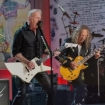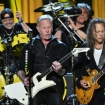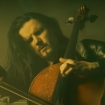On the morning of November 1st, master distiller Dave Pickerell passed away unexpectedly, just months after the launch of Metallica's Blackened whiskey, for which he had joined forces with the thrash OGs. Barely three weeks earlier, in the first days of October, we had talked to Pickerell about the innovative vision and process behind the collaboration. Here, in memory of the distiller — who the band remember as "not only a mentor and friend, [but also] a member of Metallica" — we present that fascinating interview. R.I.P.
As we all know by now, Metallica doesn't fuck around. So when the world's biggest metal band decided to move into the world of adult beverages with their own brand of whiskey, they knew they had to bring Dave Pickerell on board.
A legend in the world of whiskey, Pickerell has been obsessed with chemical engineering since childhood, an obsession that eventually led him into the world of whiskey distilling. "While I was studying for my master's degree at the University of Louisville, my mentor, Dr. Charlie Plank, discovered I was an idiot savant at distilling," he tells Revolver. "And truly, it's not about brilliance — they called me 'Grain Man' [laughs] — but I can close my eyes and see molecules running around a still and know where they're going."
Pickerell has parlayed this special knack into an impressive career in the liquor industry: From 1994 to 2008, Pickerell worked as the Master Distiller for Maker's Mark bourbon; then, after noting the resurgence of rye whiskey in American cocktail culture, Pickerell jumped ship to become the Master Distiller for WhistlePig. Through his consulting company Oak View Spirits, Pickerell has provided consultation for beverage alcohol facilities around the world, and he has personally helped build over 100 distilleries — including the rebuilding of George Washington's distillery at Mt. Vernon, New York, where he oversees the commercial production of George Washington's Rye Whiskey.
This past August, Pickerell added another item to his already-impressive whiskeyography with the release of Metallica's Blackened American Whiskey. Created in collaboration with Metallica and Meyer Sound, Blackened marries a number North America's finest whiskeys, which have been molecularly enriched by low frequency soundwaves — the barrels have literally been blasted by band-curated playlists of Metallica songs to help shape the flavor.
For this latest installment of Raise Your Horn, we spoke with Pickerell about Blackened, the "Black Noise" process that enhances it, and what it was like to work with Metallica on the project.
HOW DID YOU GET INVOLVED WITH BLACKENED?
DAVE PICKERELL Oh, what a fun project! The band members got together and decided that they were going to try and find new and different ways to reach out and touch their fan base. And even though two of them are sober, they thought that whiskey would be a real nice way to do that. They reached out to a fellow named John Bilello, who had done the Avión Tequila deal. He told, "I'd love to be involved. I know spirit sales, distribution. I know the way to go to market. I know celebrity involvement. I know all of that stuff, but I don't know whiskey." He said, "We need to go get Dave Pickerell."
So I get a call. He basically said, "Hey, I've got a celebrity-endorsed product idea that I'd like to run by you, and I'd like to see if you'd be interested in doing it." And I said, "Well, who is it?" And he said, "I can't tell you, yet — but I'd love to meet with you." He'd made it sound intriguing enough, and I was coming through San Francisco, anyway, so I just rearranged my flight and got in a little early. We talked for an hour, hour and a half, and finally he goes, "Well, OK, sign this." It was a non-disclosure agreement. He said, "I can finally tell you — it's Metallica." And I'm like, "That's all I need to know, thank you. I'm all in!" [Laughs] And that's how we got started.
WERE YOU ALREADY A METALLICA FAN GOING INTO THIS?
Oh, yeah. Though I would have to say I was a fan of the music, but didn't really know much about the band, itself. I knew their names, I knew a bit of their history — I knew about the bus crash — but I really didn't know much about the band.
OBVIOUSLY, THEY WANTED TO DO A QUALITY WHISKEY, BUT DID YOU HAVE ANY MARCHING ORDERS BEYOND THAT?
It was unlike anything I've ever done. It was more like a commissioning — one artist to another. And really, that's the way our relationship has progressed. They basically said, "We want to do a whiskey, but we don't want it to be overly-branded 'Metallica'. We want it to be a partnership deal, and we want it to be awesome. Go!" And I said, "Well, all right then — but whatever I come up with, before we go to market with it, I need y'all to convene a 'murder board,' and let me present my ideas. Y'all vet 'em, and if it's not good enough and if you're not happy with it, then I'll go back to the drawing board and keep working."
HOW DID YOU START FROM THERE?
The first thing I did was, I said, "I've gotta understand the band themselves." So I spent some time with the band, and spent a lot of time digging and researching, and I came away with three underlying thoughts: No. 1, they're collaborative — everything they do, it's a team thing, even to the point that they agreed it's either all-sign or none-sign on the bottles. The second thing was, they think outside-the-box, and do things a little bit differently. And the third, they have a process they call Metallicizing, which is the process of taking something that's already good and kicking it up a notch or two. So I said, "Great, that's what I'll do."
I started networking all over the country, and looking for really fun, interesting straight whiskeys — whiskeys that most people would be proud to throw a label on and call their own. I got rye whiskey from Canada, whiskey from Tennessee and Indiana, bourbon from Kentucky, really good whiskeys from all over North America. And then I was like, "Let's marry these all together!" [Laughs] So now we're out of the box a little bit, since we're doing stuff that most people wouldn't think of doing, and we're being collaborative. Now we've gotta kick it up a couple of notches. So we went and got a bunch of brandy barrels from Spain, and we took the married whiskey and threw it in the brandy barrels. And I said, "I've got one more thing — I want to play with sound!"
WHERE DID YOU GET THE IDEA TO BLAST THE BARRELS WITH METALLICA MUSIC?
It only seemed to make sense. I've been fascinated with ultra-low frequency sound for a long time. When I was a cadet at West Point, I was one of the seniors in charge of a group called the Cadet Ushers and Acolytes Society. We did all the ushering at the Cadet chapel. We collected offerings, got people their seats, passed out bulletins, and all that stuff, which got me to the chapel quite often. And the Cadet Chapel is a glorious affair — it's massive, it's gothic, it's the whole deal. And it's got the largest all-pipe church organ in the world, and they're constantly adding pipes to it — like, "How many pipes can we fit in here?" [Laughs] Dr. Davis was the organist while I was there, and he knew I loved music. One time I was there in the chapel, just me and him, and he goes, "Let me show you what this puppy can do!" He plays [Johann Sebastian Bach's] Toccata and Fugue in D Minor, the Phantom of the Opera song. I loved it, anyway, but hearing it on that organ in that church all by myself was incredible. And then he goes, "And now, for the full effects of the organ ..." And he played the lowest note on the register, and it just shook your guts! He said, "I can only play this note for a few seconds, because it will do structural damage to the building!" And I'm going, "Wow!" That stuck with me — that's the power of sound!
So, that's never been far from my heart. And here you've got Metallica, who play music that's got a lot of bass in it, and it's really clean, crisp, fast-moving music. And then you've got Meyer Sound, their sound company, that's one of the best electrical sound engineering companies in the country, and they've got patents on ultra-low-frequency sound woofers. When they set a woofer off at a Metallica concert, it shakes the guts of everybody in the whole stadium! And I'm like, "This is the time!" I said, "Can we have some money to do some research?" So we took a control barrel and just let it age, and then we took another barrel and let it age, and hit it with ultra-low frequency sound. And lo and behold, we got change — and we got change, quick. And positive change!
SO YOU COULD BLIND TASTE-TEST THE SONICALLY-ENCHANCED WHISKEY AND HONESTLY NOTICE A POSITIVE DIFFERENCE?
Yes! And not only did we blind taste-test it, we went farther than that — we put it on a spectrometer, we put it on a gas chromatograph, and looked for objective detail. And in that finishing period, all the extract markers went through the roof on the sonically enhanced barrel. We checked for all of the major extract notes from the barrel, and all of them were scientifically enhanced by a fair margin — and some by a humongous margin. And I'm going, "All right! It works, it actually enhances, and it's good! Let's do this!" So we trademarked the name Black Noise, and that was the last step. After we married the whiskey and put it in Spanish brandy barrels, we hit it with Black Noise.
WHEN DID YOU UNVEIL THE FINISHED PRODUCT TO THE BAND?
When got the first batch ready, and I reached out and said, "All right, can we have a murder board, please?" And it was decided that it would be at Lars' house, and he invited people. While I can't go into the names of the people, I was astounded at who he brought. [Laughs] Major heavy hitters — bazillionaires, business captains — and I got grilled, not just on the taste of the whiskey, but on the concept and business plan behind it.
I said, "Look, if we're going to taste this, we've gotta compare it against something. So I'm gonna take the best local American whiskey that's out there, I'm gonna take the best national whiskey, and I'm gonna take the best one I've ever personally been involved with, and we're gonna taste all three, and I've gotta beat 'em all. If I can't beat 'em all, I've gotta go back and work some more." If you can't stand up under harsh scrutiny, you probably didn't really have the thing! But at the end of the day, we got a hundred percent "yes," a full-on green light.
THE PACKAGING OF THE WHISKEY IS PRETTY SUBTLE-LOOKING, ESPECIALLY FOR A METAL-RELATED BEVERAGE.
I like that it's subtly branded. The word "Metallica" doesn't show up any place on the label. But if you're a Metallica fan, it screams — every Metallica fan knows that they've got the song "Blackened," they've got the Black Album, and that their recording studio is called Blackened. If you're a real nerd, and you scan the soundwave on the bottle — it's James singing "Blackened". [Laughs] And then there's the batch number on the necker. The first batch 081, which I thought was appropriate… and if you go to Blackenedwhiskey.com and type in your batch number, you can pull up the playlist on Spotify. And yes, that was all my idea. [Laughs]
SO THE SPOTIFY PLAYLIST CONTAINS THE SAME SONGS THAT YOU BLASTED AT EACH BATCH?
Yes. I was talking to an editor from another magazine about whether the sound really makes a difference, and I said, "Wait, I just happen to have a little bit of the previous batch, so let's put 'em side by side, and you tell me." So she tasted the two, and not only could she tell the difference, but she could express a definite preference for one over the other. She said, "What's the difference?" And I said, "The playlist." [Laughs] You could see her head blowing up, like holy moly!












